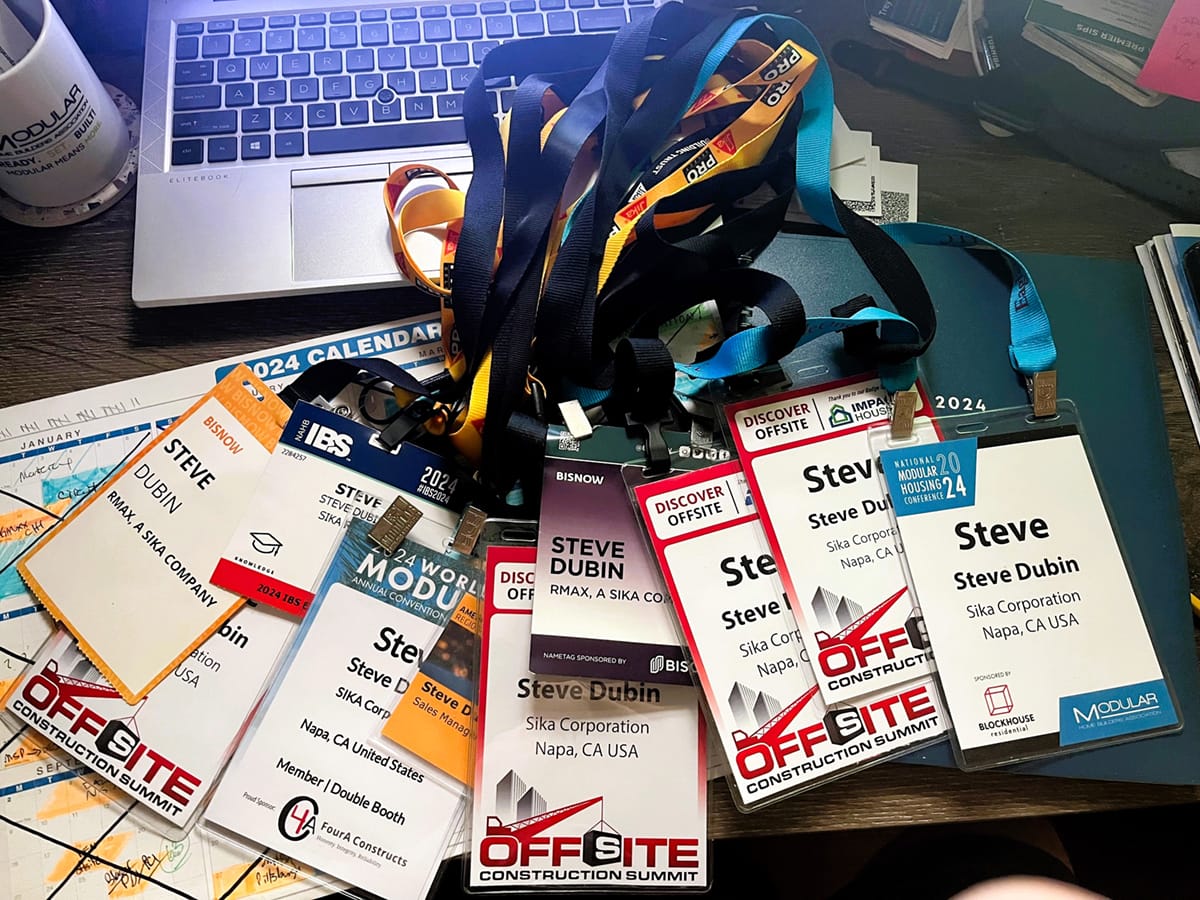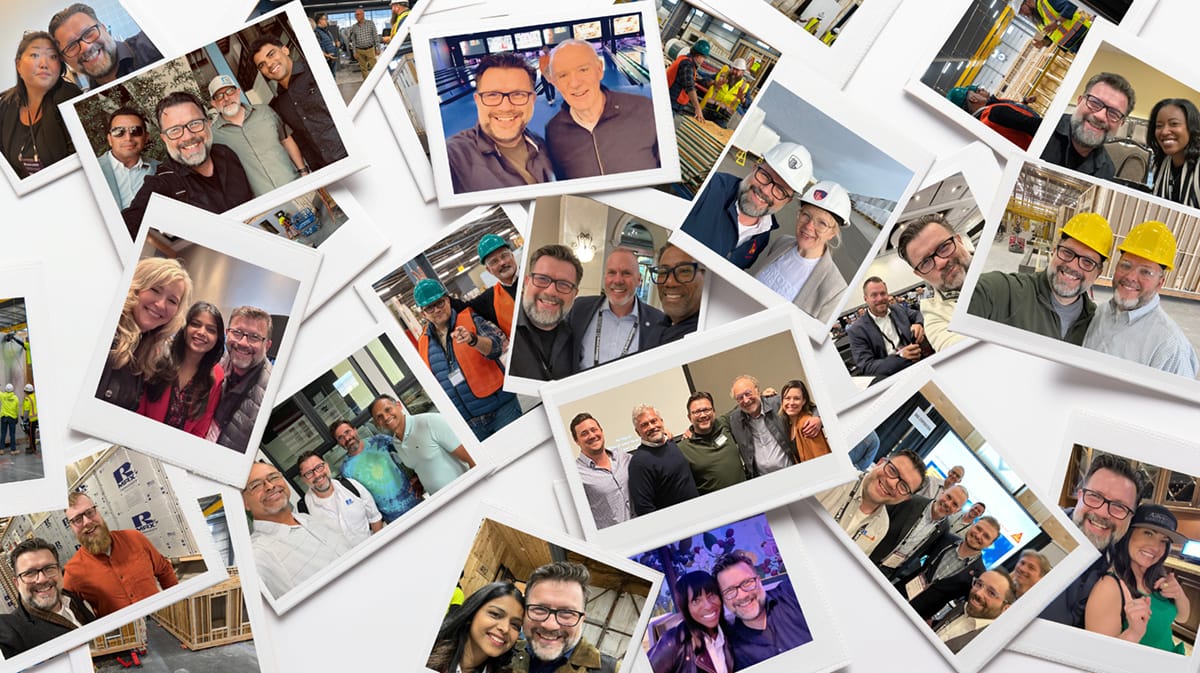Miles, Modules, and Memes: Building a Modular Network One Flight at a Time

Steve Dubin is the business development manager for RMax, a Sika Company.
A couple of years ago, I was attending a Greenbuild show hoping to explore new opportunities for residentially-focused sales. Expecting the usual low ROI of a massive trade show, this particular show had a specific focus on offsite construction innovations. There, I met Sara-Ann Logan, VP of Design at Volumetric Building Companies, who introduced me to some of their modular projects. With these, she challenged me to rethink how to support this industry. Looking back, that chance conversation shifted the trajectory of my career.
Soon after, while scrolling LinkedIn, I came across a post from Fading West about a factory tour they’d hosted. In one photo, I spotted a piece of material similar to what my company produces—definitely a lead for someone like me! I immediately dove into their profile to learn more. A month later, I met their design and operations team at a trade show. They graciously invited me to tour their Colorado facility, where I applied the new insights I had gained. This “sell” was different from my usual approach— now focusing on reducing materials and labor, streamlining processes, and eliminating supply chain pinch points- all while still meeting required building codes.
It’s amazing how a handshake at a conference or a LinkedIn comment can spark partnerships, insights, and growth that can ripple across the industry.

From laptop to lanyard: a year's journey of transforming virtual conversations into real-world relationships across the modular industry.
So, at the beginning of 2024, armed with new knowledge and a new partnership that proved the value of collaboration, I started that new role focused specifically on the modular and offsite industry. Taking the advice of a friend (and giant in the offsite construction world, the late Gerry McCaughey) who advised me to “show that that you are on the same journey as they are,” I hit the road, taking these conversations from the digital cloud to the actual clouds. There was a lot more things to learn, and a lot of factories and people to learn them from.
Observations and Insights: Lessons from a Year of Connections
I think that the best insights don’t just come from what you see—they come from the people you meet. Every conversation, every factory visit, and every conference was an opportunity to connect, share ideas, and, honestly, rethink some of the assumptions I once had.
Take building codes, for example. Initially, I understood why some modular companies stuck to the bare minimum in building codes—cost competition with traditional construction. But through conversations with industry leaders, I saw how pushing beyond code creates long-term advantages, like smoother processes and higher-quality results
Many people assume that modular construction should be cheaper than traditional methods, and I used to be one of them. But after talking with people across the industry, I now know that’s not the point at all. Modular isn’t about being cheaper—it’s about being better. Through all these connections, I’ve seen the real value: faster timelines, higher-quality builds, and quicker returns. It’s not just about saving money upfront; it’s about getting people into homes, hotels, and hospitals faster, which is where the true impact lies. And the stories I’ve heard—like projects being completed 18 months earlier than expected—are proof that modular can deliver in ways traditional construction just can’t, or won’t.
One of the more interesting themes this year has been how teams within modular companies interact—or don’t. I’ve heard plenty of stories about how design and manufacturing sometimes don’t quite sync up, or how operations and purchasing scramble to buy materials last minute. But I’ve also met people who’ve cracked the code on collaboration. Those conversations have been inspiring, and they’ve taught me that even when modular has its hiccups, it’s still way ahead of traditional construction in terms of coordination and adaptability.
Looking back, it’s clear that the real difference maker for me this year has been the people. Every connection I’ve made has brought a new perspective or sparked an idea I hadn’t considered before. It’s been a year of learning, thanks to some incredible folks in this industry who are just as passionate about moving modular forward as I now am.
Becoming a “Thought Leader” (Apparently)
Somehow, in this short time, because of my interactions both in-person and online, I’ve become something of a known entity in the modular field, sometimes being referred to as a ‘thought leader,’ which is appreciated, but feels misplaced. I see myself more as a learner- especially this early into my entrance into this particular market space. Sharing insights, visiting factories, and engaging online have helped me connect with others equally excited about modular construction. This industry is a close-knit community, and it’s been humbling to see how my efforts to engage have resonated with others. I’m grateful for the chance to contribute and to learn from the incredible people driving this industry forward. The only reason I’ve been able to take on this role is because I’ve had the privilege of learning from others who are actually ‘thought leaders’ themselves.
The Power of Community
At its core, modular construction thrives on collaboration. Every trip I’ve taken this year has underscored the importance of relationships—whether it’s over a great breakfast with Russ Willis at MODLOGIQ, factory visits with the wonderful people at Mandeville Modular, Simplex Homes and Stratford Building Corporation, deep conversations about energy codes with Muncy Homes and Z Modular, sharing contacts between Guerdon and Vederra at an Offsite Construction Summit, or sharing experiences over dinner with innovators at Wind River Built. The fantastic teams at Blazer Industries, REMO Homes, Northstar Systembuilt, and so many others continue to inspire and redefine what construction is.

A small collection of real-world moments with just a sampling of some of the brightest minds in modular and offsite construction.
Social Media: A Gateway to Real Connections
It’s been mentioned a couple times here, so let’s talk about social media a moment. Social media is a powerful way to connect and share, but it’s easy to misstep if you’re not mindful. Here are some lessons I’ve learned, sometimes the hard way:
- Don’t Post in the Heat of the Moment: Venting frustration online can damage relationships you’ve worked hard to build. Before posting, take a breath and ask, “Will I stand by this tomorrow?” Most times, it’s better to wait. A short-sighted post I put up early last year was understandably not received well, and prompted a tough conversation with someone I respect, and I regret that post still.
- Do Share Something Useful: Focus on adding value by sharing insights, tips, or lessons learned. Helpful content naturally sparks conversations and creates opportunities without being pushy. Instead of being a shill for the company or product you represent, offer insights into what drives your business or product. For me- that’s things like energy codes, air and moisture mitigation, sustainability and the like.
- Do Show Up for Others: Engaging with others’ content—through thoughtful comments or sharing—builds goodwill. Supporting others without expecting immediate benefits often leads to unexpected and meaningful connections.
- Don’t Forget the Human Side: Posts that show gratitude, recognize effort, or share lessons resonate more than polished self-promotion. People connect with authenticity. It’s okay to disagree with others, but do so respectfully, as you would in real life.
At the end of the day, social media is just another tool for building connections, and like any other tool, needs to be used skillfully to work properly. Use social media thoughtfully, and it will open doors to real opportunities and relationships you didn’t even see coming.
Why Connections Matter
In the modular industry, I’ve noticed that the best breakthroughs often happen in informal moments—over shared meals, casual chats, or even LinkedIn comment strings. Partnerships build smarter, more efficient projects, creating a network that supports innovation and growth.
These connections go beyond just business. By collaborating, we’re able to tap into different perspectives and experiences, which leads to better solutions and stronger networks. Every conversation and partnership strengthens the whole industry and encourages us all to keep pushing forward. Relationships are what it is all about, and we can’t push this forward without working well together.
What’s Next?
Looking ahead, I’m gearing up for the World of Modular show, where I’ll be participating in a panel discussion along with other ‘thought leaders’ on leveraging social media to elevate personal and brand awareness in the modular space. I encourage anyone reading this article to join me for that presentation, or any of the other fantastic presentations that will be part of the show.
I have seen firsthand that the modular industry thrives on connections—both in how we build and how we grow. Every conversation, every mile traveled, and every module placed brings us closer to a stronger, more innovative community. Here’s to forging bonds, building dreams, and shaping the future together. Cheers to what’s ahead!
About the Author: Steve Dubin is a Business Development Manager for Rmax, a Sika Company, focusing on modular and offsite construction manufacturers. He currently serves on the board of directors for the Modular Home Builders Association, as well as an Associate member on the Building Systems Council for the NAHB. You can reach him on LinkedIn or at dubin.steve@us.sika.com.
More from Modular Advantage
AoRa Development Aims for New York’s First Triple Net Zero Building Using Modular Methods
More cities are providing funding for newer infrastructure projects as long as they meet sustainability requirements. This is how modular can fit the bill, thanks to its lower waste production.
Developers and Designers: Lessons Learned with Modular Design
Modular construction is attractive to many developers because sitework and module construction can occur simultaneously, shortening the schedule and reducing additional costs.
UTILE: Putting Modular Building on a Fast Track
In Quebec, UTILE is taking the lead in creating affordable modular buildings to help decrease the student housing shortage. During the process, the company discovered what it takes to make the transition to modular building a success.
Sobha Modular Teaches Developers How to Think Like Manufacturers
With its 2.7 million square foot factory in UAE, Sobha Modular is bringing both its high-end bathroom pods to high-end residences to Dubai while developing modular projects for the U.S. and Australia.
RoadMasters: Why Early Transport Planning is Make-or-Break in Modular Construction
In modular construction, transportation is often called the “missing link.” While it rarely stops a project outright, poor planning can trigger costly delays, rerouting, and budget overruns.
Navigating Risk in Commercial Real Estate and Modular Construction: Insights from a 44-Year Industry Veteran
Modular projects involve manufacturing, transportation, and on-site assembly. Developers must understand exactly what they are responsible for versus what they subcontract. Risk advisors should research the developer’s contractors, subcontractors, and design-build consultants—especially the modular manufacturer.
Art²Park – A Creative Application of Modular and Conventional Construction
Art²Park is more than a park building—it’s a demonstration of what modular construction can achieve when thoughtfully integrated with traditional materials. The use of shipping containers provided not only speed and sustainability benefits but also a powerful structural core that simplified and strengthened the rest of the building.
Building Smarter: A New Standard in Modular Construction Efficiency
Rising material prices, labour shortages, expensive financing and tightening environmental rules have made conventional construction slower, costlier, and more unpredictable. To keep projects on schedule and within budget, builders are increasingly turning to smarter industrialized methods.
Resia: Breaking All the Rules
Resia Manufacturing, a division of U.S.-based Resia, is now offering prefabricated bathroom and kitchen components to industry partners. Its hybrid fabrication facility produces more precise bathroom and kitchen components (modules) faster and at lower cost than traditional construction. Here’s how Resia Manufacturing does it.
How LINQ Modular Innovates to Bring Modular To The Market in the UAE and Beyond
LINQ Modular, with an office and three manufacturing facilities in Dubai, is a modular firm based in United Arab Emirates. The company is on a mission: to break open the housing and construction markets in the Gulf Cooperation Council (GCC) area with modular.










